Nurses are angels in white. They save lives and heal the wounded, sometimes even more tired than doctors. When your profession involves anything from running alongside a gurney to standing for hours in the emergency room or operating room, the right shoes are a must.
Being on your feet all day puts your lower extremities under a lot of stress. So if you constantly wear unsupportive shoes, you could develop sore arches, joint pain, and other uncomfortable problems.
Fortunately, there are plenty of shoe options perfect for people who are on their feet all day; you just have to know what to look for. What kind of shoes do nurses wear?

1. In clinical work, nurses have higher requirements for the comfort of shoes: Specific requirements for nurse shoes are slope heel, soft sole, white or light color, and cowhide.
3. The bottom of nurse shoes should be light, flexible, and of the right size: The sole has a wide range of force and walking. So, the safety factor is high.
2. Nurse shoes usually refer to the work shoes worn by hospital nurses: They come with a white, soft sole, soft surface, and shallow heel.
4. Nurse shoes used in hospitals are cloth rubber-soled shoes: This kind of shoe is light and breathable, comfortable. It is also non-slip and quiet.
5. Nurse’s shoes are all white: It conforms to the principle of sterility and rigorous operation by nurses.
What To Look For When Buying Shoes For Nurses?
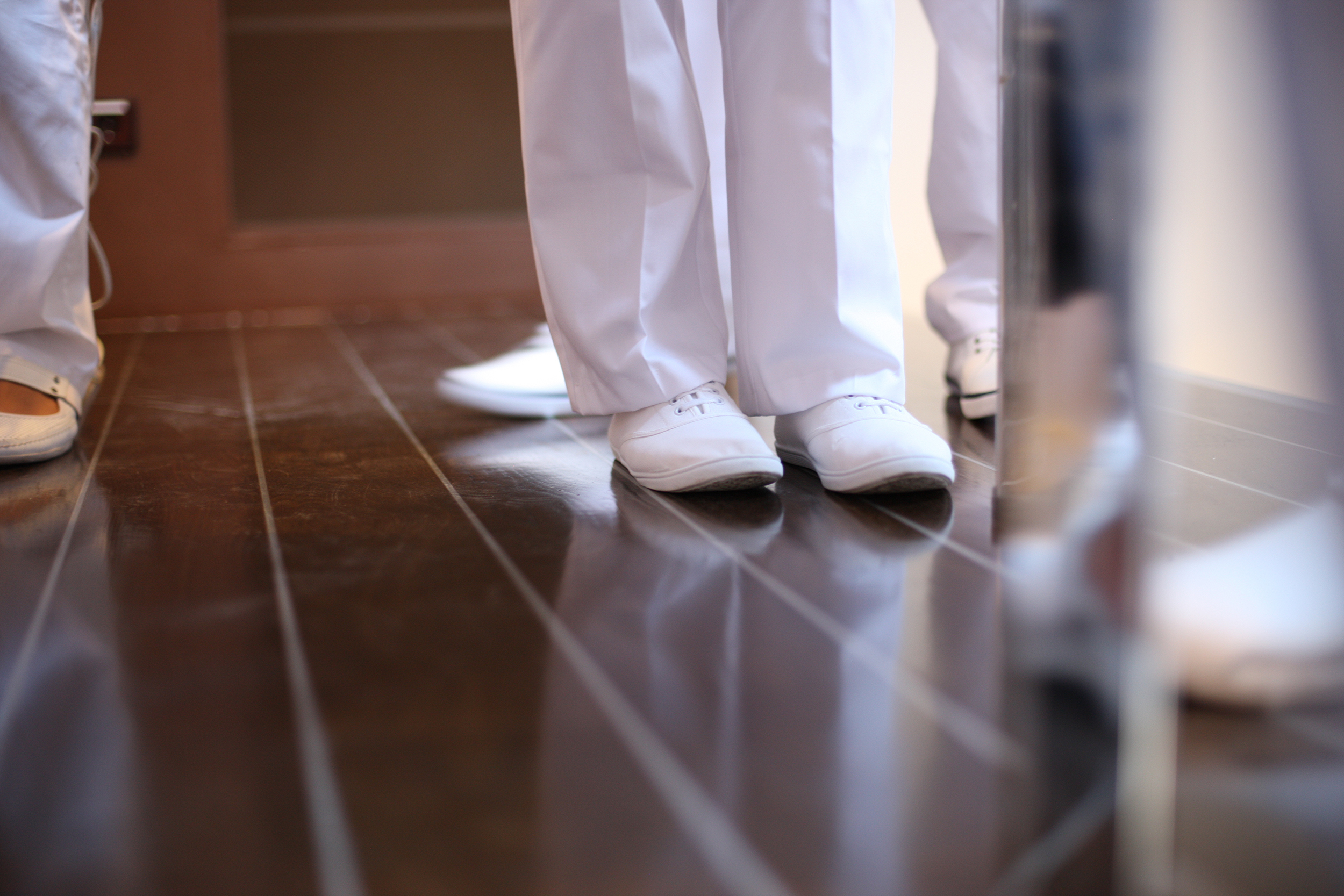
- Support: Constant standing and loading weight on their feet make nurses susceptible to various foot health issues, so Chien advises to go for comfortable shoes that have a thick-enough supportive sole. It’s also important to have good arch support for stabilizing the foot and ankle, Tikiwala adds. Dr. Meghan Kelly, assistant professor of foot and ankle surgery at Mount Sinai Icahn School of Medicine, says that one way she tests for adequate support is by trying to bend a shoe in half. “A good supportive shoe will not easily crease in the middle,” she explains.
- Breathability: Nurses’ feet are also often confined in closed-toe shoes for hours at a time. Ventilation is important “so that sweat (and odor) do not accumulate, and fungal/bacterial infections are prevented,” Chien explains. For the medical setting, she recommends a sneaker with a mesh upper.
- Shoe shape and fit: The biggest thing to keep in mind, Kelly says, is that shopping for nursing shoes isn’t a “one size fits all” approach. “Based on the foot shape and associated issues related to the foot, some shoes may be more suitable and comfortable than others,” she adds. Tikiwala echoes: “The biggest issue is that people are wearing one or two sizes smaller than their actual size, which can then lead to painful deformities.” Make sure to avoid shoes with a narrow toe box so your toes don’t rub against the tops or sides, Chien adds. A good rule of thumb is to measure up to the largest toe of your larger foot. Make sure, too, that there is “about half an inch, which is usually the width of a finger, between the tip of the longest toe and the end of the shoe,” says Chien.
- Non-slip sole: A grippy sole helps with stability and balance — helpful for nurses who have to walk or run around multiple times a day in an environment where they’re likely to be exposed to various types of fluids and liquids.
Why High-Quality Shoes Matter to Nurses?
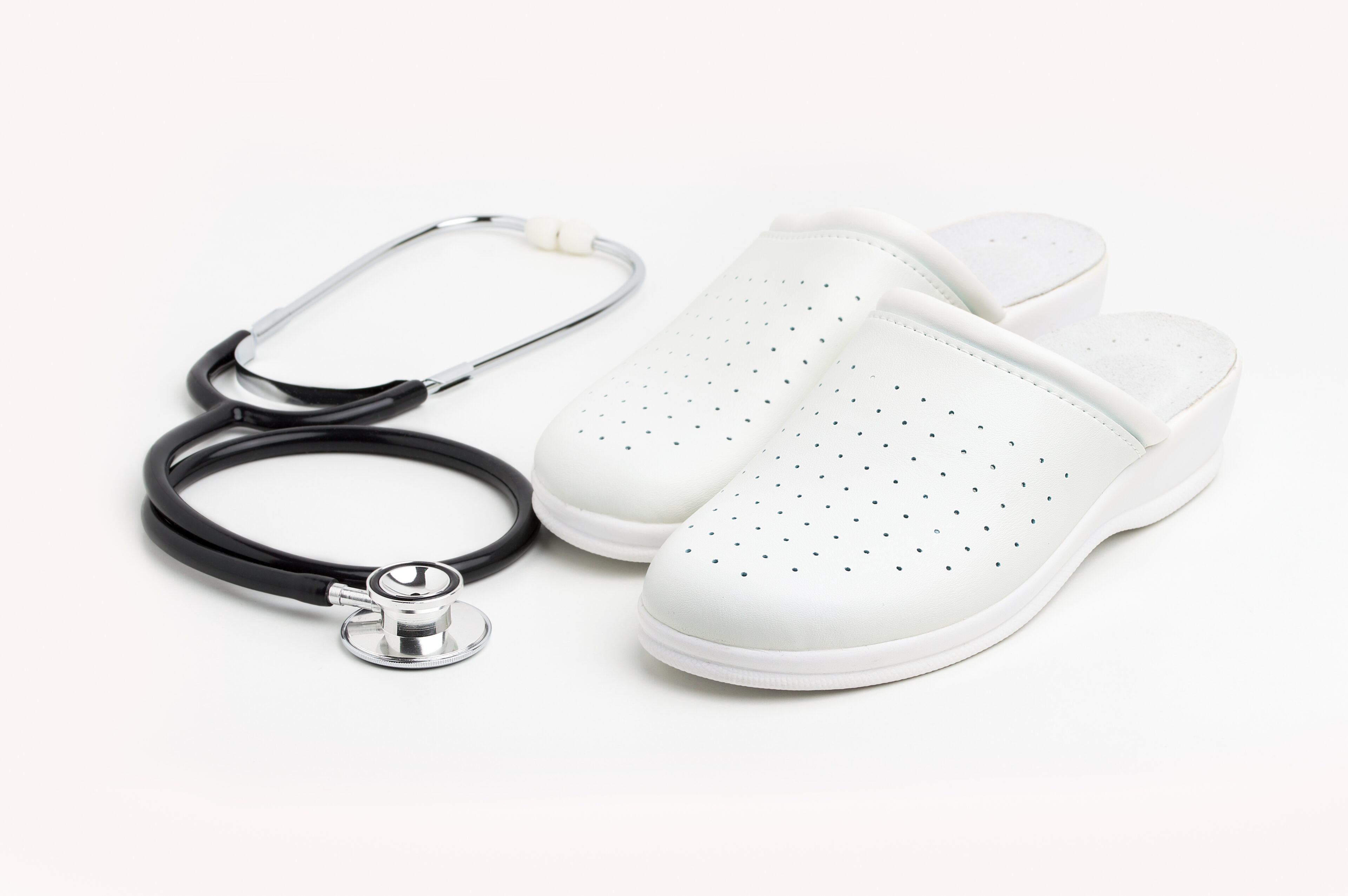
Nurses have quite a few things to consider when it comes to purchasing the best nursing shoes. It’s important to question if the shoes are:
- Slip-resistant, non-slip, and water-resistant to repel all sorts of liquids
- Breathable with a good amount of cushioning
- A roomy enough toe box to allow for feet to expand during the day
- Sharps resistant to protect vulnerable feet from needles and other sharp objects
- Durable enough to last with a strong insole, midsole, and outsole – especially if they come with a high price tag
- Provide lots of support, comfort, and shock absorption for standing, running, walking, and sprinting for all those long shifts!
- Easy enough to clean, and even better, if they are stain-resistant
On top of that, each nurse has their own unique needs when it comes to foot, ankle and even back health like:
- Plantar fasciitis
- Wide feet and footbeds
- Arch support
- Heel pain
- Flat feet
- Foot pain
- Back pain
When it comes down to it, purchasing a new pair of nurse shoes is a pretty big decision and could be quite an investment. There are so many questions when it comes to buying new high-quality shoes for work:
- Is that expensive pair of shoes really worth it, for a work shoe?
- Should nurses wear classic clogs to easily slip on or a nice pair of tennis shoes (sneakers)?
- Or should nurses go with Crocs, for their affordability and ease of cleaning?
- What are the most comfortable shoes with the perfect fit?
- Which shoes are best for standing for 12, or more, hours a day?
Shoes Material
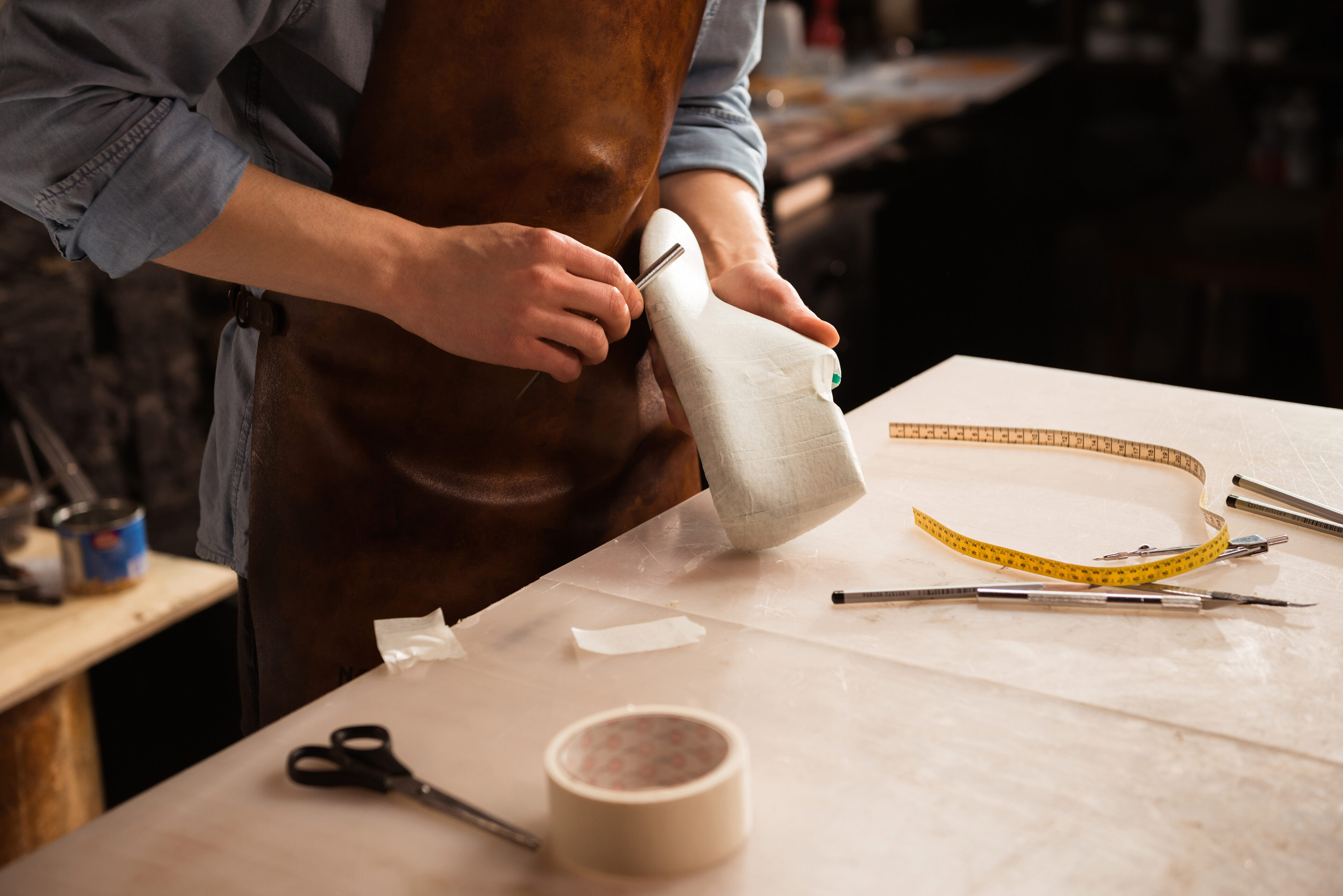
Shoes material they are made of:
The material from which the shoes are made is also important. Most nurses prefer leather and rubber. This is because these materials do not allow liquid to seep through them.
In an environment where spills of all kinds of liquids are common, leather and rubber help keep skin dry and safe.
Lightweight sneakers are preferred because they reduce stress on the feet. They also reduce the amount of energy needed for running and walking.
Non-slip soles also help prevent accidents and different companies incorporate different technologies to ensure that the soles of the shoes have good traction.
The amount of time and research that goes into developing the perfect nurse shoe is enormous. However, a nurse finds the search for the perfect shoe far from ideal.
Each person has their own individual preferences and choices. This is why most nurses prefer to try on several different shoes before deciding on one they like.
What Type of Shoes Do Nurses Wear?
1. Sneakers For Nurses
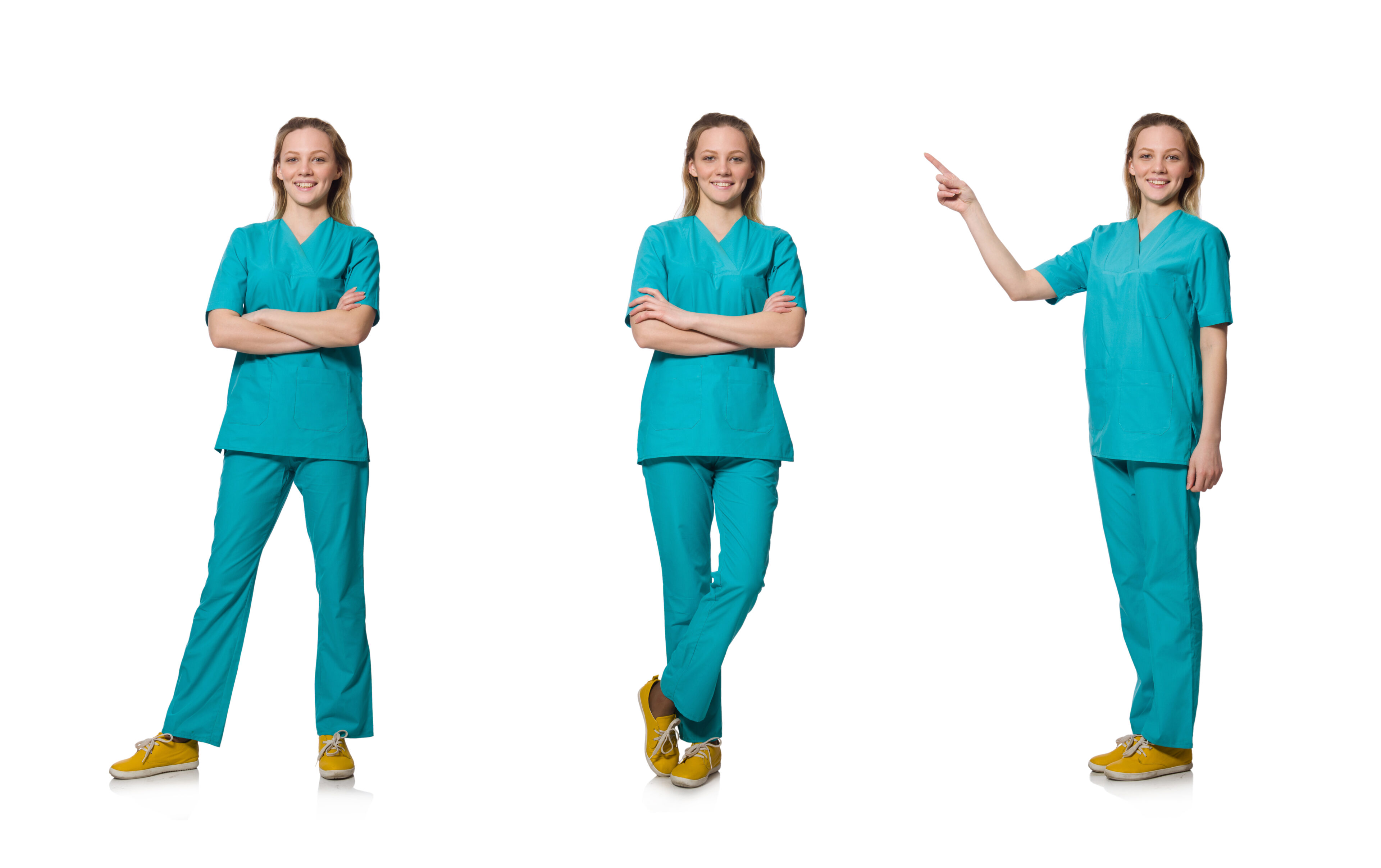
Everyone knows that a nurse leads a tremendously fast-paced life. This is especially true in all critical areas of the hospital.
Examples of this would include ICU and emergency rooms. Emergencies mean that the nurse must run from one place to another.
That is why the nurse needs footwear that gives her a good grip on the floor. Nurses find that sneakers or tennis shoes are best suited for this type of hospital area.
As a future nurse, you will be responsible for the care of patients. You will need to have good communication skills and a positive attitude towards your patients to do this. It would be best if you also were comfortable and confident when working with patients and their families. That’s why we recommend that you wear comfortable and professional white leather sneakers while you work. They will be an essential part of your uniform, making you look and feel professional.
2. Clogs for Nurses
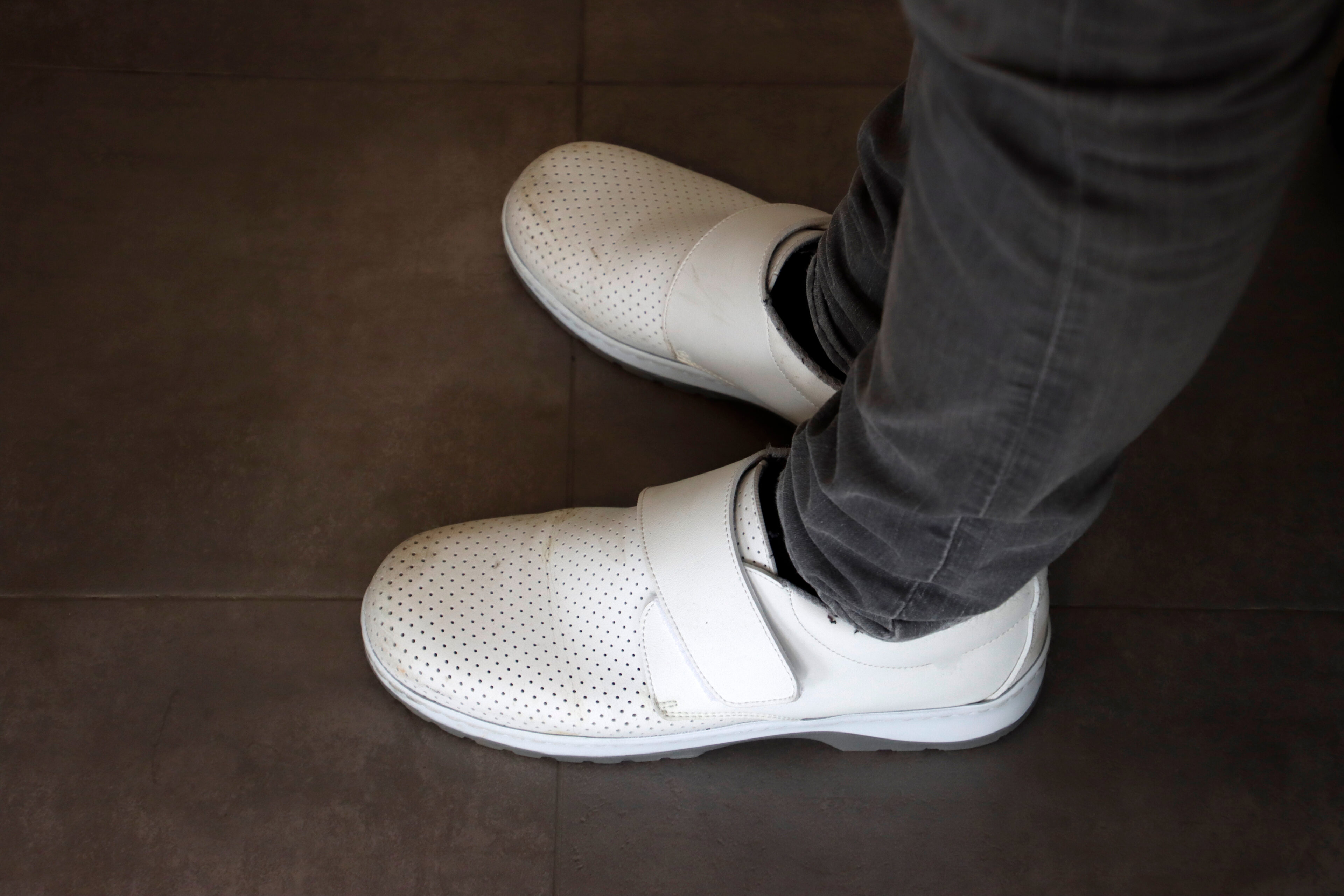
These are one of the most popular shoes that nurses wear. They have a closed heel and closed toe.
This means that the foot is protected from all angles. Since these shoes are roomy too, they are extremely comfortable. Another thing that makes clogs highly desirable is that they are easy to wear and can be designed to relieve pressure from various pressure points on the feet.
3. Slip on shoes for nurses
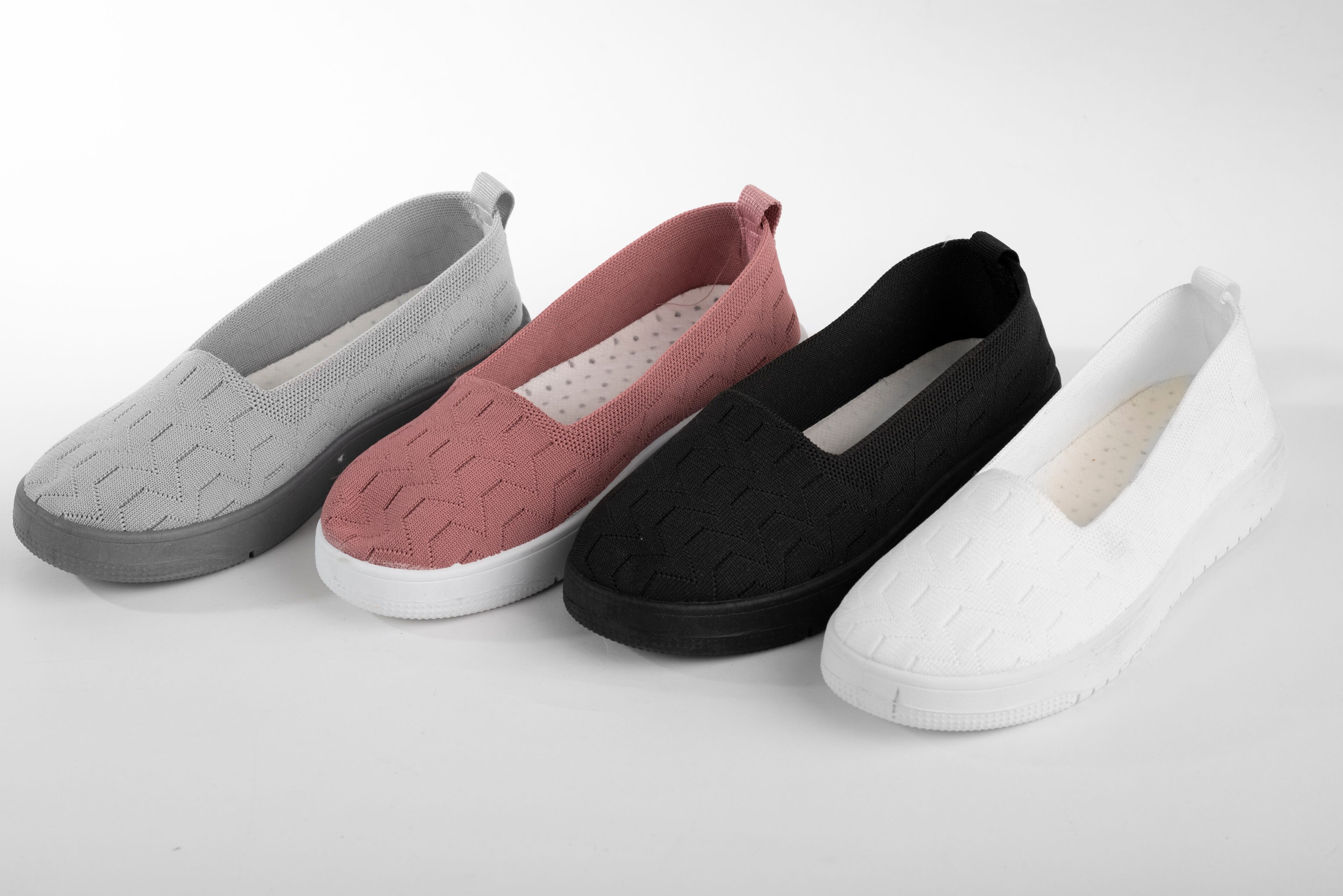
These are one of the most popular shoes that nurses wear. They have a closed heel and closed toe.
This means that the foot is protected from all angles. Since these shoes are roomy too, they are extremely comfortable.
Slip-on shoes work well with the nursing profession as they are quick to change and easy to use. This factor comes in handy when you are in an operation theater and have to maintain sterility. Due to the protocol practiced across the world, nurses have to remove the external footwear, which means they have to change often. This is why slip-on shoes or slippers are a practical option here.
Hospital Shoes For Nurses
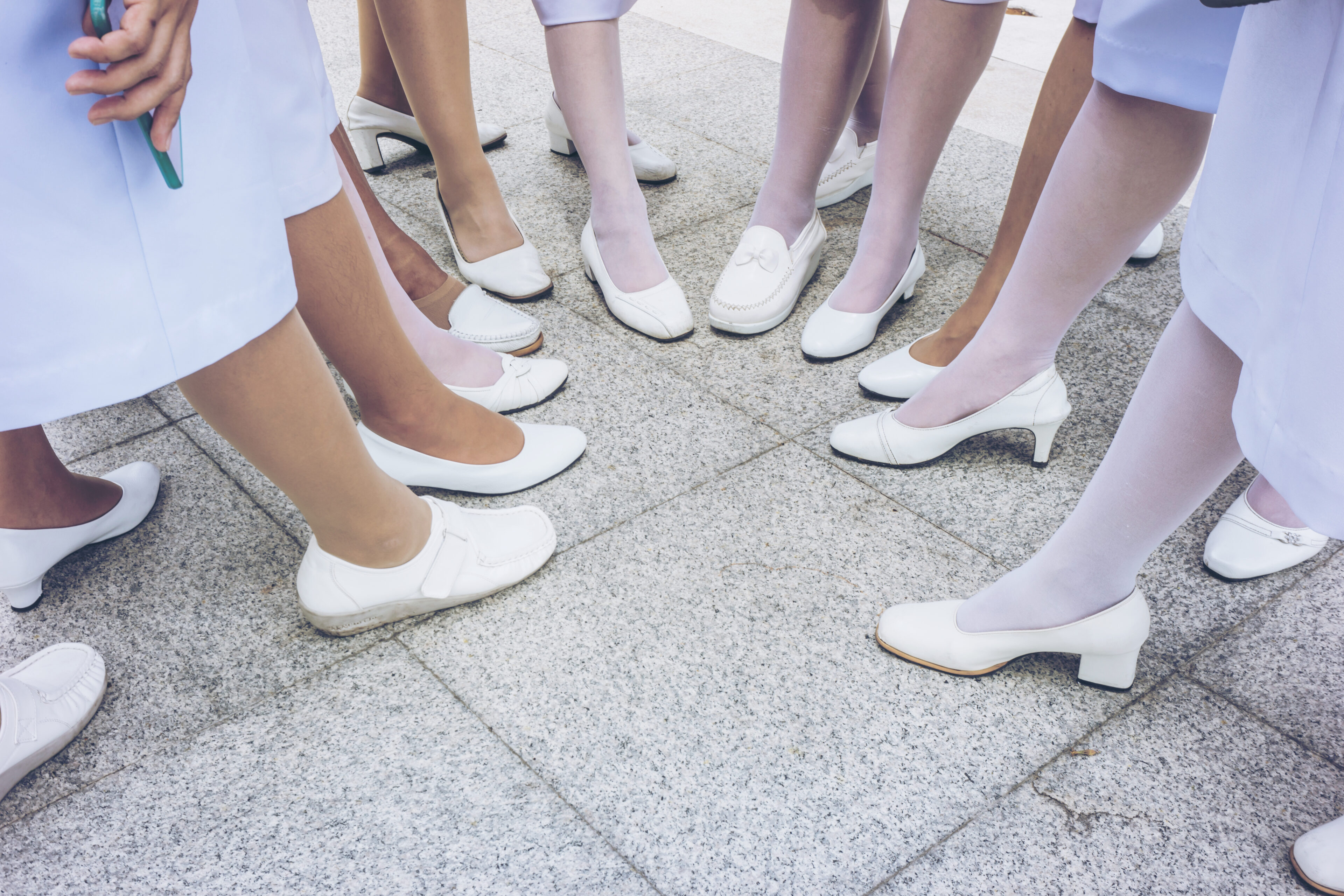
In some hospitals, nurse shoes need to be purchased uniformly. Medical professional shoes and nurse uniforms are the same as hospital necessities, especially in a private clinic or in an operating room. A pair of comfortable nursing shoes is crucial. Nurses are usually busy at work and go back links.
Walking for a long time undoubtedly requires a pair of comfortable nursing shoes. So, the material of the nurse shoes should choose soft soles. The soft soles of upstairs and downstairs are more comfortable, which is convenient for nurses’ daily work and also provides more efficient help for work.
The leather surface of nurse shoes should be breathable, difficult to stuff your feet, and difficult to produce athlete’s feet. Walking for a long time makes it easy to sweat. So, the more breathable shoes will make the feet healthier.
Nurse shoes are not only available in women’s styles, but men’s nurse shoes are also necessary. Nurses are the national treasure of the nursing department. They take on a lot of work and they need a pair of comfortable nursing shoes.
It is necessary to choose a good brand of nurse shoes to ensure quality. Another thing that makes clogs highly desirable is that they are easy to wear and can be designedMost hospitals, depending on the department, will buy the department’s uniform shoes to relieve pressure from various pressure points on the feet. Even if a few nurses are not used to wearing uniformly purchased nurse shoes, we must choose good quality nurse shoes. Provide excellent protection for every nurse who wears it, so that the nurses can work more comfortably.
Benefits of Wearing Hospital Shoes
Wearing hospital shoes should not be a chore. Think about the advantages offered by this type of equipment for the foot and the complete body. Nurses typically wear closed-toe shoes to protect their feet from debris, sharp objects, and other hazards. Some nurses may also wear open-toe shoes when working in areas where they may encounter water or other slippery surfaces.
For Optimal Nurse Safety
The regulations in force relating to hygiene and preventing infection in hospitals stipulate that the wearing of specialized footwear is compulsory for all medical personnel: doctors, nurses, nursing assistants. The chief advantages are that it is personal protective equipment.
Nurses and caregivers have a hectic day assisting with care and medical visits, bringing medication, or replacing patients’ serums. They are on duty day and night during their internship period. If ever while moving the nurse slips, he risks injuring himself with the needles and catheters, nurses who work in critical care or other high-risk professions may wear special shoes to protect their feet from potential injuries.
To avoid this kind of risk, a non-slip shoe is perfect for the nurse. With the soles designed specifically for traveling on a slope or wet ground, medical personnel should find that the risk of slipping will be significantly reduced. And even without slipping, these sharp objects can still fall from his or her hands or those of the doctor, or even by being struck by the patient. These shoes may be made from hard, durable materials that can protect the feet from dirt and other debris.
Thus, to prevent this danger, the nurse must wear a pair of protective shoes that meet the standards. Slip on, sneakers, or clogs, it is necessary to check the tightness and the reference of the standard on the product to know if it is perfectly suitable for the nursing profession.
- Practical Accessories
Besides these advantages mentioned above, it should also be noted that medical shoes have an exceptional quality of use. When we talk about the quality of use, we refer to the practicality of the product, including ease of maintenance and durability.
A nurse’s shoe or sneaker is indeed very easy to maintain and clean. It is possible thanks to their simple design and their material of manufacture. These professional shoes, whether for men or women, dry faster and wash easily compared to regular sneakers and sneakers.
If nurses do not have enough time for washing, they can use a washing machine to process these sandals.
And yet, in the respect of hygiene, they must wear clean clothes, from the headdress to the shoes through the blouse. On returning home, they must also change and disinfect these work clothes, since the hospital is the environment where the risk of microbial contamination is the highest. It does not perform such a decontamination procedure, the equipment could transmit nosocomial infections, typical of the medical environment.
Why Do Nurses Wear Clogs?
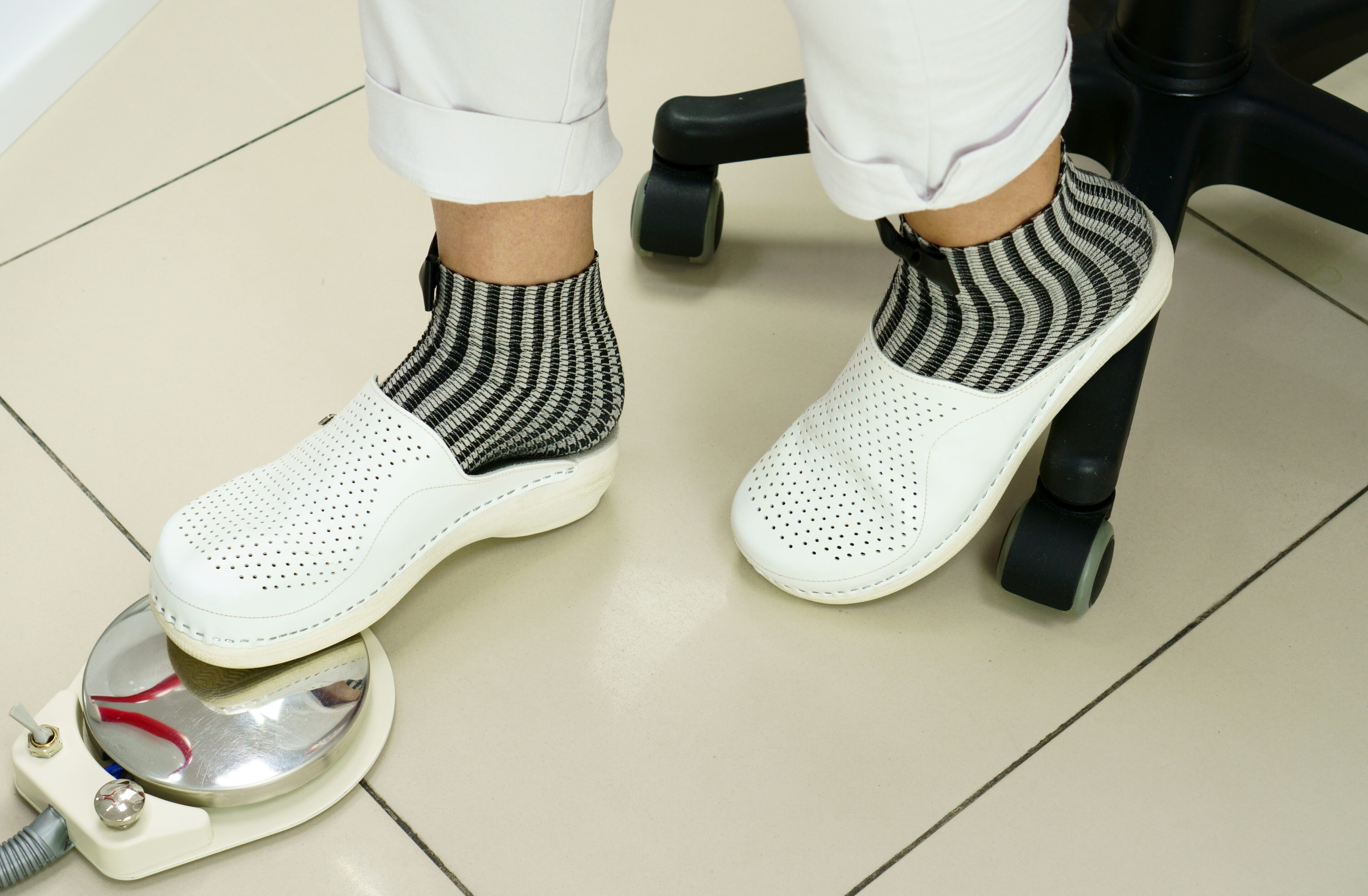
Clogs are footwear known for providing adequate support throughout the bottom of the foot. High-quality clogs help nurses minimize foot, ankle, knee, and back pain throughout the day. It is essential because nurses spend many hours on their feet with little chance for rest or comfort.
Unlike shoes with holes, we recommend it in an operating room since a surgical operation often takes several hours. The studies thus comprise assisting the doctor during the operation, all this in the same operating theater.
The strengths of the hoof live in its impact resistance. The trainee will no longer be afraid of heavy objects falling on his feet. No risk of crushing will scare him. It is the most suitable model for safety shoes for a woman or a man working in a medical space. If the clogs were available for wood before, they now come in leather.
The strengths of the hoof live in its impact resistance. The trainee will no longer be afraid of heavy objects falling on his feet. No risk of crushing will scare him. It is the most suitable model for safety shoes for a woman or a man working in a medical space. If the clogs were available for wood before, they now come in leather.
FAQs
What kind of shoes do nurses wear?
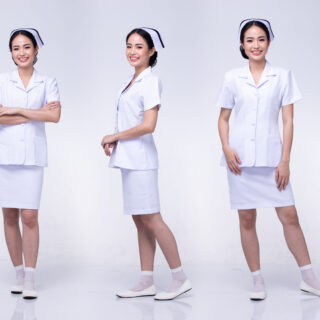
Nurses are interested in hospital sandals, so you can go for sports, slip on or clog shoes. These accessories are shaped analogous to classic sneakers and modern sneakers, although they have additional functionality to make them suitable for medical use.
Being light and elegant, the nurse will feel comfortable in her normal sneakers while following the training sessions in the hospital.
They will move through the rooms and corridors of the hospital carefree while she wears this type of white leather slipper. Apart from that, they are closed shoes that offer more security. They are essential models to prevent the risk of occupational accidents. In addition, they come with a non-slip sole.
Like everyday nursing shoes, the medical range also includes shoes and sneakers for men and women and unisex items. In addition, you have the possibility to choose between the different colors.
Why do nurses wear white shoes?
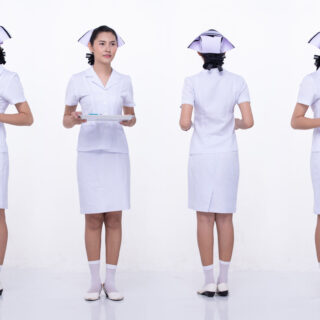
It’s a great way of inviting the patients over and showing them that you are a nurse. White is seen as a color that can go with just about everything when it comes to scrubs.
The color white signifies purity, innocence, cleanliness, honesty, and faith. These are qualities of the devoted and caring patient-centered nurse. While white uniforms have been associated with nursing for a long time, this was not the case historically and the uniform has evolved over time.
What shoes are appropriate for nursing?
For any nursing, comfortable shoes are essential. It would be best to choose shoes that feel good to your feet and allow them to move quickly. Some nurses like wearing sneaker shoes because they don’t have to worry about getting dirty or wet. However, if you are on your feet all day, you might want to consider choosing a shoe with a cushioned insole, which helps reduce stress and fatigue.
